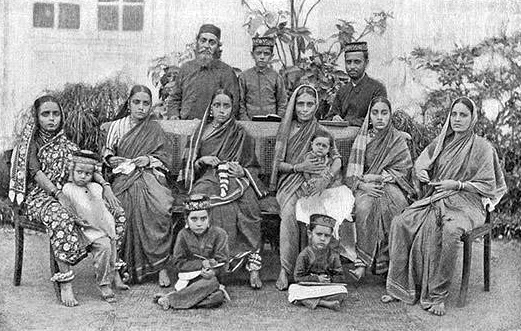I would like to thank Sinhora Sassoon from the American Jewish Joint Distribution Committee who provided information on the Bene Israelis to Breaking Matzo.
The Bene Israelis are the oldest Jewish community in India, having arrived two thousand years ago and constituting about 90% of the Jewish population in the country today. They have always lived in harmony with their fellow religionists and freely practice their religion today.
The Bene Israelis claim to have descended from the “ten lost tribes” of Israel; their ancestors having escaped by sea from the persecution of the Greek overlord Antiochus Epihanes in the year 175 B.C.E., landing shipwrecked on the shores of Navgaon. The Bene Israelis subsequently settled in Konkan, adopting the local customs and the native Marathi language. They worked in the oil pressing and agricultural industries, and due to their observation of the Sabbath (the day of rest), they were known as Shanwar Tellis (Saturday Oilmen). Although the Bene Israelis were said to have lost all their holy books in the shipwreck, forgetting all prayers except “Shema Yisrael”, they did observe the Sabbath and major Jewish festivals and practise circumcision.
Towards the middle of the 18th century, there was a gradual influx of Bene Israelis into Bombay from neighbouring Konkan villages. This was mainly due to the development of the transport system and the growth of employment opportunities in the army with the advent of British rule, as well as a tolerant religious climate under Governor Gerald Aungier. The Bene Israelis were known for their valour and fighting spirit which distinguished them from other soldiers in the British Army.
One such Bene Israeli soldier was Commandant Samaji Hasaji Divekar – Samuel Divekar. In one of the wars fought by the British against the kingdom of Mysore in south India, he was captured along with other British Indian soldiers. The King of Mysore, Tipu Sultan, who was a Muslim, was about to order Divekar’s execution when his mother intervened, saying that the Bene Israelis are referred to in the Koran as the Chosen People of the Almighty. After being spared, Samuel Divekar decided to thank the Lord by building a synagogue. He built the first Bene-Israel synagogue in India in 1796. It was named “Shaar Harahamim” (Gate of Mercy) Synagogue, and is situated at Samuel Street in Bombay.
Soon after the Shaar Harahamim Synagogue was built, four synagogues were constructed and the community enjoyed a resurgence of congregational worship. Many Bene Israelis came to Bombay to enlist in the army, whilst others took to government service. In 1875, Samuel Haeem Kehimkar founded the “Israelite School” (renamed the Sir Elly Kadoorie School in 1934) to provide education for the youth of the community.
The Bene Israelis excelled in the Army, the Navy and the Air Force both before and after Indian Independence in 1947. They held high positions in various Government departments, and many were doctors, lawyers, engineers, writers, educators, architects and social workers – indeed a vast array of professions that made up the rich social fabric of this community. Dr. E. Moses, himself a Bene Israeli, was Mayor of Bombay in 1937.
At the time of Indian Independence, the entire Bene Israeli community in the country stood at approximately 20,000. However, the number significantly dropped within a few years of the establishment of Israel in 1948, due to systematic immigration to this newly established state. Today, the Bene Israeli community in India in Mumbai, Pune, Ahmedabad, Calcutta, Cochin and Delhi, stands at around 5,000.
Jews first came to Thane in the 16th century. Most served in the army, giving gallant service under the great Chhatrapati Shivaji Maharaj who created an independent Maratha Kingdom in the 1600s.
The GIP railway was constructed during British rule. The railway track from Thane to Bombay was completed in 1853, and the Parsik Tunnel connecting Thane and Kalyan, which is still in existence today, was constructed at a later date. Many Jews who came to work in Thane settled there after retirement, thus increasing the numbers in the community. Jews lived with their religious neighbours in harmony, understanding and co-operation.
In 1879, the Jewish community of Thane pooled together their resources and built a beautiful stone synagogue.
Presently, as per the latest trends in demographics, there are approx. 4,400 Jews remaining in India.
Microscopic as the Jewish community of India is, they have made a contribution to the economic, cultural and social development of the country, and are proud of their Indian heritage, traditions and culture. To the credit of the tolerant spirit of India, there has been no discrimination of any kind against Jews. India is a country in which there is no anti-semitism. Indian Jews serve as ambassadors of goodwill and peace between India and Israel.






